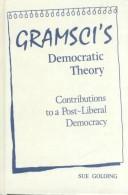| Listing 1 - 4 of 4 |
Sort by
|
Book
ISBN: 9004417699 Year: 2020 Publisher: Leiden, The Netherlands ; Boston : Brill,
Abstract | Keywords | Export | Availability | Bookmark
 Loading...
Loading...Choose an application
- Reference Manager
- EndNote
- RefWorks (Direct export to RefWorks)
Revisiting Gramsci’s Notebooks offers a rich collection of historical, philosophical, and political studies addressing the thought of Antonio Gramsci, one of the most significant intellects of the twentieth century. Based on thorough analyses of Gramsci’s texts, these interdisciplinary investigations engage with ongoing debates in different fields of study. They are exciting evidence of the enduring capacity of Gramsci’s thought to generate and nurture innovative inquiries across diverse themes. Gathering scholars from different continents, the volume represents a global network of Gramscian thinkers from early-career researchers to experienced scholars. Combining rigorous explication of the past with a strategic analysis of the present, these studies mobilise underexplored resources from the Gramscian toolbox to confront the actuality of our ‘great and terrible’ world. Contributors include: Francesca Antonini, Aaron Bernstein, Derek Boothman, Watcharabon Buddharaksa, Takahiro Chino, Riccardo Ciavolella, Carmine Conelli, Anthony Crézégut, Valentina Cuppi, Yohann Douet, Anne Freeland, Fabio Frosini, Lorenzo Fusaro, Robert Jackson, Alex Loftus, Susi Meret, Sebastian Neubauer, Alessio Panichi, Ingo Pohn-Lauggas, Roberto Roccu, Bruno Settis, Anne Showstack Sassoon, Alen Sućeska, Peter D. Thomas, Nicolas Vandeviver, Marta Natalia Wróblewska.
Marxist criticism. --- Gramsci, Antonio, --- Quaderni del carcere (Gramsci, Antonio)
Book
ISBN: 0231548869 9780231548861 9780231190398 0231190395 9780231190381 0231190387 Year: 2021 Publisher: New York
Abstract | Keywords | Export | Availability | Bookmark
 Loading...
Loading...Choose an application
- Reference Manager
- EndNote
- RefWorks (Direct export to RefWorks)
Antonio Gramsci is widely celebrated as the most original political thinker in Western Marxism. Among the most central aspects of his enduring intellectual legacy is the concept of subalternity. Developed in the work of scholars such as Gayatri Spivak and Ranajit Guha, subalternity has been extraordinarily influential across fields of inquiry stretching from cultural studies, literary theory, and postcolonial criticism to anthropology, sociology, criminology, and disability studies. Almost every author whose work touches upon subalterns alludes to Gramsci’s formulation of the concept. Yet Gramsci’s original writings on the topic have not yet appeared in full in English.Among his prison notebooks, Gramsci devoted a single notebook to the theme of subaltern social groups. Notebook 25, which he entitled “On the Margins of History (History of Subaltern Social Groups),” contains a series of observations on subaltern groups from ancient Rome and medieval communes to the period after the Italian Risorgimento, in addition to discussions of the state, intellectuals, the methodological criteria of historical analysis, and reflections on utopias and philosophical novels. This volume presents the first complete translation of Gramsci’s notes on the topic. In addition to a comprehensive translation of Notebook 25 along with Gramsci’s first draft and related notes on subaltern groups, it includes a critical apparatus that clarifies Gramsci’s history, culture, and sources and contextualizes these ideas against his earlier writings and letters. Subaltern Social Groups is an indispensable account of the development of one of the crucial concepts in twentieth-century thought.
Philosophy. --- Political science --- Social sciences --- Gramsci, Antonio, --- Quaderni del carcere (Gramsci, Antonio)

ISBN: 1282045792 9786612045790 1442675489 0802027997 0802076742 9781442675483 9780802027993 9780802076748 9781282045798 Year: 1992 Publisher: Toronto
Abstract | Keywords | Export | Availability | Bookmark
 Loading...
Loading...Choose an application
- Reference Manager
- EndNote
- RefWorks (Direct export to RefWorks)
An in-depth study of Antonio Gramsci?s prison notebooks (Quaderni del carcere) and his specific contributions to radical democratic theory. The book encompasses English, Italian, and French debates on the subject as well as political and philosophical discussions concerning the limitations of liberal and socialist democratic theory.
Book
ISBN: 9789004303690 9004303693 9789004245198 9004245197 Year: 2015 Publisher: Leiden Boston
Abstract | Keywords | Export | Availability | Bookmark
 Loading...
Loading...Choose an application
- Reference Manager
- EndNote
- RefWorks (Direct export to RefWorks)
Gramsci's works, in particular his Prison Notebooks , are a real 'workshop' of activity. Even though these texts were the product of a great mind and an organic conception of the world, the particular context in which they are written poses challenges for their interpreters. This philological 'excavation' of the pathways of Gramsci's thinking brings us closer to an author who is more 'widely-known' than he is understood. The first part of the volume deals with central themes of Gramsci's worldview such as the concepts of the state, civil society, ideology, common sense, morality and conformism. The second part deals with Gramsci’s relations with thinkers as diverse as Machiavelli, Marx, Engels, Labriola, Togliatti, whereas the third part offers some reflections on the metaphors used by Gramsci as well as contemporary views of the Sardinian Communist. First published in Italian by Carocci Editore as Sentieri gramsciani , 2006.
Gramsci, Antonio, --- Gramshi, Antonio --- Gramši, Antonije --- Gramshi, A. --- Gramši, Antonio --- Gkramsi, Antonio --- גרמשי, אנטוניו, --- Gkramsi, Antonio, --- Gramshi, Antonio, --- Gramši, Antonije, --- Gramši, Antonio, --- Quaderni del carcere (Gramsci, Antonio) --- Noterelle sulla politica del Machiavelli (Gramsci, Antonio) --- Gram�si, Antonije, --- Gram�si, Antonio,
| Listing 1 - 4 of 4 |
Sort by
|

 Search
Search Feedback
Feedback About UniCat
About UniCat  Help
Help News
News